United States Army Provost Marshal General
The provost marshal general (pronounced "provo") is a United States Army staff position that handles investigations of U.S. Army personnel. It is the highest-ranking provost marshal position in the U.S. Army, reporting to the Chief of Staff of the United States Army. The position brings all aspects of law enforcement in the U.S. Army in a single office.[1]
| Provost Marshal General of the United States Army | |
|---|---|
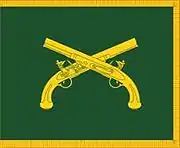 | |
| Formation | January 10, 1776 |
| First holder | CPT William Marony |
| Website | Official Website |
The role has been off and on since 1776 (usually in periods of war time). After shutting down in 1974 at the end of the Vietnam War, it was resurrected on January 30, 2003 following the September 11 attacks.
It is responsible for:
- United States Army Military Police Corps (since 2003)
- United States Army Criminal Investigation Command (CID) (since 2003)
- United States Army Corrections Command (ACC) (since 2007)
Prior to its most recent organization, the responsibilities of this position were scattered across various army units.
History
American Revolutionary War
William Marony was the first provost marshal general, appointed by George Washington on January 10, 1776. The principal job was maintaining jails and supervising 40 executions. Nine men served as provost marshal general until 1778 when the duties were transferred to the Marechausse Corps. Service ended at the end of the war.[2][3]
American Civil War
_(14576397547).jpg.webp)
James B. Fry was appointed on March 3, 1863 to be the first provost marshal general during the American Civil War. The office dealt with recruitment and desertion issues. It also supervised the Invalid Corps, in which disabled soldiers performed garrison duty (as opposed to field duty). The position was abolished in 1866.[2] An 1866 proposal to reorganise the Army to include a Provost Marshal's Bureau "consisting of a Provost Marshal General with the rank, pay and emoluments of a Brigadier General and an Assistant Provost Marshal General with the rank, pay and emoluments of a Colonel of Cavalry" was rejected on the grounds "that it creates an unnecessary office for an undeserving public servant".[4]
Spanish–American War
Arthur MacArthur, Jr. was appointed provost marshal general of Manila in July 1901 to provide law enforcement in Manila and the provinces. The position was abolished after about a year.[2]
World War I
Enoch Crowder was appointed provost marshal general in July 1917 with focus on enforcing the Selective Service System. During the American Expeditionary Force provost marshal generals oversaw military police, prisoner of war, criminal investigation, and circulation in Europe. Among the European marshals were Hanson E. Ely, William H. Allaire, John C. Groome III, and Harry Hill Bandholtz. The European component was dissolved in 1919 and the provost marshal general remained an advisor to the War Department until 1927.[2]
World War II
The Basic Field Manual in 1937 outlined the position when it was reactivated. Allen W. Gullion was appointed in 1941. Its duties initially were to control enemy aliens but were later expanded to do security clearance investigations and Military Police. After 1943 it was responsible for prisoner-of-war camps in the United States as well as Japanese-American relocation camps. Toward the end of the war it began investigating crimes and apprehending deserters and would handle the War Crimes Division of the Judge Advocate General's Office.[2]
Post World War II
Gullion remained until April 1944 when he was succeeded by Archer L. Lerch, Blackshear M. Bryan in 1945, Edwin P. Parker Jr. in 1948, William H. Maglin in 1953, and Haydon L. Boatner in 1957.[2]
Vietnam War
Ralph J. Butchers was appointed in 1960 followed by Carl C. Turner in 1964, Karl W. Gustafson in 1968 and finally Lloyd B. Ramsey in 1970 until the office was abolished on May 20, 1974.[2]
War on Terror
After the start of Operation Iraqi Freedom, the position of provost marshal general was recreated.
List of provost marshals general
Here is the list of provost marshals general:[5][6]
| Name | Photo | Term began | Term ended | |
|---|---|---|---|---|
| 1. | MG Allen W. Gullion | 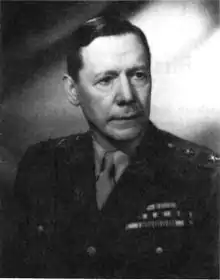 | July 31, 1941 | April 27, 1944 |
| 2. | MG Archer L. Lerch |  | May, 1944 | July 17, 1945 |
| 3. | MG Blackshear M. Bryan | 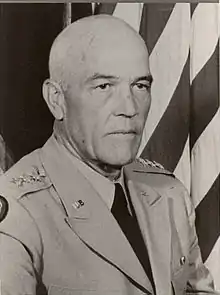 | July 17, 1945 | April 9, 1948 |
| 4. | MG Edwin P. Parker Jr. | 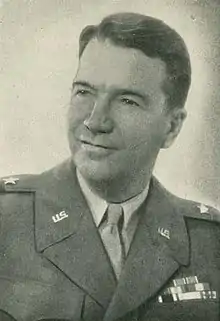 | April 10, 1948 | February 4, 1953 |
| 5. | MG William H. Maglin |  | February 5, 1953 | September, 1957 |
| 6. | MG Haydon L. Boatner | 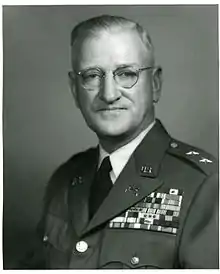 | November 19, 1957 | October 31, 1960 |
| 7. | MG Ralph J. Butchers |  | December 1, 1960 | July 1, 1964 |
| 8. | MG Carl C. Turner |  | July 1, 1964 | September 30, 1968 |
| 9. | MG Karl J. Gustafson |  | September 30, 1968 | July 14, 1970 |
| 10. | MG Lloyd B. Ramsey |  | July 14, 1970 | May 20, 1974 |
| Position abolished on May 20, 1974 | ||||
| 11. | MG Donald J. Ryder | 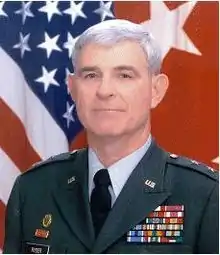 | October 29, 2003 | July 14, 2006 |
| 12. | BG Rodney L. Johnson |  | July 14, 2006 | January 15, 2010 |
| 13. | BG Colleen L. McGuire |  | January 15, 2010 | September 28, 2011 |
| 14. | MG David E. Quantock | 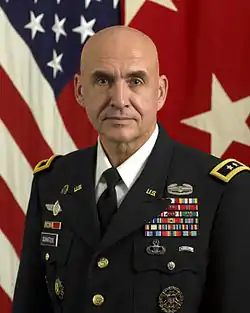 | September 28, 2011 | October 27, 2014 |
| 15. | MG Mark S. Inch |  | October 27, 2014 | May, 2017 |
| 16. | MG David P. Glaser | .jpg.webp) | May 2017 | June 2019 |
| 17. | MG Kevin Vereen | .jpg.webp) | June 24, 2019 | Incumbent |
See also
- Provost Marshal's Office (United States Marine Corps)
- Masters-at-Arms (United States Navy)
- United States Air Force Security Forces
- USADIP
References
- Taylor, Scott. "Provost Marshal General back in the saddle again", Military Police, April 2004. Accessed October 12, 2009. "With an office in the Pentagon (a first for the position), the Provost Marshal General now serves as the Army Staff's single source for law enforcement, providing executive oversight for planning, resourcing, policy making, and execution of full-spectrum law enforcement and security support to the Army. Functional areas include criminal investigations, police intelligence, physical security, corrections and internment, and antiterrorism."
- Evolution of the Office of the Provost Marshal General by Ronald Craig - Military Police - April 2004
- "545th Military Police Company - first-team.us - Retrieved October 10, 2009". Archived from the original on 2008-10-21. Retrieved 2009-10-12.
- p.157 Hamilton, Gail The Biography Of James G. Blaine Kessinger Publishing, 2005
- "Office of Provost Marshal General of the United States Army" (PDF). army.mil/opmg. 2010-07-04. Retrieved 2013-10-16.
- "Office of Provost Marshal General of the United States Army" (PDF). army.mil/opmg. 2017-12-26. Retrieved 2017-12-26.